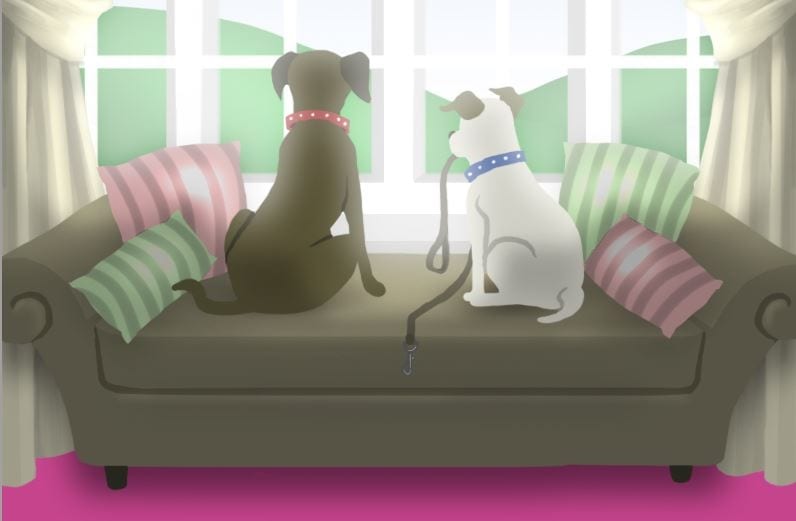Table of Content
It can be an exercise pen or a small room with everything your dog loves, including a comfy bed, toys, food, and water. Ever since my dog was a puppy, she has destroyed window coverings at each home we moved to. Since this only occurred when we were gone, all the experts I talked to and the literature I read called it Separation Anxiety. There was very little that I could do about it since my wife and I had to go to work. Recently, I needed her to stay at my mother‘s house and sure enough, she destroyed my mother’s window coverings as well.
By the time I am ready to leave, the dog will be pleading me have access to all these goodies. I would then ask the dog to hold a stay while I scatter all these goodies on the floor and then I would say "go!" to release the dog from the stay as I exit the door. Some dogs will experience strong separation anxiety from their owners, and you may find bite marks, scratch marks or chew marks on areas such as windows or doors. Before you leave the house, give your dog chew toys to keep them entertained while you’re gone. A dog’s destructive behavior could be the result of stress.
How to Stop Your Dog's Destructive Behavior When Left Alone
What you want to be careful of, however, is having the sound be too loud or in the same room. Leave it as background noise coming from a different part of the home to help keep them serene and calm. If you are able, you can also program some noise machines to come on periodically.
In addition to your graduated absences exercises, all greetings should be conducted in a very calm manner. When saying goodbye, just give your dog a pat on the head, say goodbye and leave. Similarly, when arriving home, say hello to your dog and then don’t pay any more attention to him until he’s calm and relaxed. The amount of time it takes for your dog to relax once you’ve returned home will depend on his level of anxiety and individual temperament. You must judge when your dog is able to tolerate an increase in the length of separation. Each dog reacts differently, so there are no standard timelines.
Provide Entertainment
That way, you will be able to keep an eye on your dog from wherever you are. Depending on your dog’s personality, they may be triggered by many other factors. Some dogs are better with the curtains closed while others love to watch people passing by. Some dogs can’t stand the phone ringing, so you may be better off shutting down the ringer before you leave. Another option to consider is hiring a companion for your pet.

Puppies chew — it's normal behavior, so you need to keep the dog away from your possessions or completely puppy-proof the house by removing everything behind safe barriers. If you do find your dog chewing on something inappropriate correct the dog by taking the object away. Direct his attentions to an appropriate chew object and give praise when he chews on said object.
OK to Leave My Puppy Alone at Home?
That’s a huge number of owners just as diverse as their pets, but one thing all of these dog owners have in common is that they leave the house from time to time. It only took me a moment to put two and two together and know that what she was saying was true. With the Separation Anxiety diagnosis, I had thought Roxy was destroying window coverings because she was at the window looking for me. Training your dog to "Sit," "Come," "Lay," "Wait," and so on not only teaches him good manners, it also provides great mental stimulation. Try an obedience class to help you teach him the basics and work on training in short sessions every day.

Treating medical or behavioral problems quickly makes them easier to prevent and eliminate. It is normal for dogs to chew on things, dig, and be protective over their territory. Dogs are diagnosed with destructive tendencies when they destroy things we don’t want them to, such as furniture, shoes, doors, or carpets. When a dog chews on the wrong things or digs in the wrong place but does not have any other symptoms, this is considered a primary destructive behavior. Dogs that have other symptoms like anxiety, fear, or aggression in combination with their destructive behavior are diagnosed with secondary destructive behavior. Both types of destructive behavior can lead to problems with other organs, such as teeth, skin, the stomach, or intestines, if left untreated.
Does Destructive Behavior Get Better?
The reason she only destroyed the window coverings was because her destruction was in relationship to trying to escape. “Many dog owners have been led to believe that their dog is suffering from “Separation Anxiety,” when often times nothing could be further from the truth. Take the dog for a walk on your lunch break or hire someone to take the dog for a walk during the day and get the dog out of the house and not thinking about food. Talking to the vet about prescription medication for anxiety. Having a pet sitter come walk the dog twice a day while you’re gone.

She couldn’t even give them toys because the dogs easily destroyed those. When no one is available to supervise him, he is crated. The dog parent also set up a strong outdoor kennel for the dog. Decreases chances of your dog chewing into furniture and other stuff at home.
It’s not at all uncommon for dogs to destroy things. And has nothing exciting and appropriate to spend it on. Also, some diseases cause your dog to eat non-food items. When a dog is sick, they could start acting destructive. And many are skeptical if this trait can be seen in dogs as well.

Early, intensive training, beginning at puppy age, will help your dog to understand what it can and cannot chew on, where it can go, where it can dig, etc. Your veterinarian can help you develop a training program to teach your dog what it is allowed to chew on and where it is allowed to dig. It is also important to expose your dog to all kinds of people, animals, and situations while it is still young. This will help your dog learn how to behave in all situations. Waiting until your dog is older could bring on excessive shyness, anxiety, and/or protective behaviors that are not appropriate for public places. It is also important to watch your pet carefully for any changes in its behavior and to address the changes immediately.
For the first two weeks the dog cannot be allowed any unsupervised time. Put him in his crate each and every time that he is left alone. Do not give him an opportunity to chew a forbidden object without feedback. Finally, remember that when you bring home a new dog, you’re committing to a long-term relationship. Be sure you have time to dedicate to your new family member.


No comments:
Post a Comment